PALM BEACH, Fla. (AP) – President Donald Trump announced on Sunday that the American public might experience “some pain” as a result of the trade war initiated by his tariffs on Canada, Mexico, and China. Trump claimed that Canada would “cease to exist” without its trade surplus with the United States, stirring confusion and concern from Canadian officials.
Canada’s U.S. ambassador expressed bewilderment, stating, “We view ourselves as your neighbor, your closest friend, your ally.” The tariffs, which Trump signed during a weekend at his Florida resort, have elicited mixed reactions, including panic, anger, and uncertainty. Analysts warn that this move threatens to undermine long-standing trade relations in North America and could complicate diplomatic ties with China.
In a social media post, Trump acknowledged the possibility of economic repercussions, saying, “WILL THERE BE SOME PAIN? YES, MAYBE (AND MAYBE NOT!). BUT WE WILL MAKE AMERICA GREAT AGAIN, AND IT WILL ALL BE WORTH THE PRICE THAT MUST BE PAID.” His administration has yet to clarify the extent of the economic impact or the criteria for lifting these tariffs, which are scheduled to take effect on Tuesday.
Kristi Noem, the Homeland Security Secretary, suggested on NBC’s “Meet the Press” that any price increases would stem from outside reactions to U.S. laws. Trump specifically targeted Canada, imposing a 25% tariff on Canadian goods alongside a 10% tax on oil, natural gas, and electricity. In response, Canada announced retaliatory tariffs on over $155 billion worth of U.S. products, including alcohol and fruit.
Trump criticized Canada's trade surplus, claiming that the U.S. is self-sufficient in energy and has ample resources in lumber. However, it’s important to note that about one-quarter of the oil consumed in the U.S. comes from Canada, and more than 60% of U.S. crude oil imports originate from there.
Prime Minister Justin Trudeau has called for Canadians to support domestic products and cautioned that Trump's tariffs would create pain throughout North America, as more than 75% of Canadian exports go to the U.S. Ambassador Kirsten Hillman remarked on the confusion among Canadians about the sudden shift in trade dynamics and reflected the hurt felt in her country.
In addition to Canada, Mexico's President Claudia Sheinbaum announced new tariffs in retaliation and suggested that the U.S. should focus on addressing drug addiction issues domestically. She and Trudeau emphasized their countries' strong bilateral relations following Trump's announcement.
The Chinese government has also indicated it will take action to protect its economic interests and plans to file a lawsuit with the World Trade Organization. For Trump, a significant concern is whether rising inflation may put political pressure on him to reconsider his stance on tariffs. During his previous campaign, he criticized Democrats for inflation rates under President Joe Biden, which stemmed from supply chain issues exacerbated by various global crises.
Trump, who previously boasted of low inflation during his presidential term, now appears to face the contradiction of his tariffs potentially causing price increases. “Inflation is a disaster,” he said at a Philadelphia rally, identifying it as a crucial issue for the U.S. economy.
Former Treasury Secretary Larry Summers described the tariffs as a “self-inflicted wound” on the American economy, estimating that inflation could rise by as much as 1% over the next nine months. He warned that aggressive behavior in international relations rarely leads to sustainable success and predicted that Chinese leadership would emerge stronger from the situation.
Analyses indicate that Trump's tariffs could inadvertently harm the very voters he aims to support. According to research from Yale’s Budget Lab, an average American household could lose approximately $1,245 in annual income due to the tariffs, equating to a potential tax increase of over $1.4 trillion across ten years. Goldman Sachs, in its analyst note, suggested the tariffs would likely be implemented but acknowledged the potential for a last-minute compromise, though the outlook remains uncertain.










